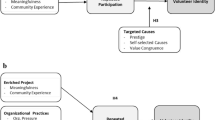Abstract
Individual motivation is the core of the actualization and continuity in voluntary work from both the standpoint of theoretical research and practical volunteerism. Volunteer motivation also provides an excellent research area for investigating the wider sociological theme of late-modern participation. This study, based on the data from 18 interviews, explores volunteer motivation utilizing a phenomenological approach to individual experience and the meaning of volunteerism. Using a phenomenological approach illuminates the nature of volunteer motivation more holistically. The research includes 767 motivational elements in 47 themes and develops an innovative four-dimensional octagon model of volunteer motivation—the theoretical and practical applications of which are discussed.
Similar content being viewed by others
References
Alderfer, C. P. (1969). An empirical test of a new theory of human needs. Organizational Behavior and Human Performance 4, 142–175.
Allen, N., and Rushton, J. P. (1983). Personality characteristics of community mental health volunteers. Journal of Voluntary Action Research 12, 36–49.
Avrahami, A., and Dar, Y. (1993). Collectivistic and individualistic motives among kibbutz youth volunteering for community service. Journal of Youth and Adolescence 22, 697–714.
Bandura, A. (1986). Social Foundations of Thought and Action: A Social Cognitive Theory, Prentice-Hall, New Jersey.
Beck, U. (1992). Risk Society: Towards a New Modernity, Sage, London.
Beck, U. (2000). The Brave New World of Work, Polity Press, Cambridge, UK.
Beck, U. et al. (1994). Reflexive Modernization, Polity Press, Cambridge, UK.
Berger, P. L. (2002). Secularization and de-secularization. In: L. Woodhead et al. (ed.), Religions in the Modern World, Routledge, London, pp. 291–298.
Chambré, S. M. (1995). Being needful: Family, love, and prayer among AIDS volunteers. Research on the Sociology of Health Care 12, 113–139.
Chambré, S. M. (1997). The spirituality factor: Exploring the link between volunteering and faith. Volunteer Leadership, April-June, 19–21.
Chappel, N. L., and Prince, M. J. (1997). Reasons why Canadian seniors volunteer. Canadian Journal on Aging 16, 336–353.
Clary, E. G. (1986). Socialization and situational influences on sustained altruism. Child Development 57, 1358–1369.
Clary, E. G. et al. (1992). Volunteers' motivations: A functional strategy for the recruitment, placement and retention of volunteers. Nonprofit Management and Leadership 2, 333–350.
Clary, E. G. et al. (1996). Volunteers' motivation: Findings from a national survey. Nonprofit and Voluntary Sector Quarterly 25, 485–505.
Clary, E. G. et al. (1998). Understanding and assessing the motivations of volunteers: A functional approach. Journal of Personality and Social Psychology 4, 16–30.
Clary, E. G., and Orenstein, L. (1991). The amount and effectiveness of help: The relationship of motives and abilities to helping behavior. Personality and Social Psychology Bulletin 17, 58–64.
Clohesy, W. W. (2000). Altruism and the endurance of the good. Voluntas 11, 237–253.
Cnaan, R. A. et al. (1993). Religious people, religious congregations and volunteerism in human services: Is there a link? Nonprofit and Voluntary Sector Quarterly 22, 33–51.
Cohen, A. P. (1985). The Symbolic Construction of Community, Tavistock Publications, London.
Colaizzi, P. (1978). Psychological research as a phenomenologist views it. In: R. Valle and M. King (eds.), Existential-Phenomenological Alternatives for Psychology, Oxford University Press, New York.
Davis Smith, J. (1996). Volunteering in Europe. Social Work in Europe 3, 19–24.
Deci, E. L., and Ryan, R. M. (1985). Intrinsic Motivation and Self-Determination in Human Behavior, Plenum, New York.
Festinger, L. (ed.) (1957). A Theory of Cognitive Dissonance, Row Peterson, Evanston, IL.
Ford, D. H. (1987). Humans as Self-Constructing Living Systems: A Developmental Perspective on Behavior and Personality, Erlbaum, Hillsdale, MI.
Ford, M. E. (1992). Motivating Humans: Goals, Emotions and Personal Agency Beliefs, Sage, London.
Freud, S. (1915/1957). Instincts and their vicissitudes. In: The Standard Edition of the Complete Psychological Works of Sigmund Freud, Hogarth, London, Vol. 14, pp. 117–140.
Freud, S. (1926). A General Introduction to Psychoanalysis, G. S. Hall (trans.), Boni and Liveright, New York.
Gaskin, K., and Davis Smith, J. (1995). A New Civic Europe? A Study of the Extent and Role of Volunteering, Volunteer Center UK, London.
Giddens, A. (1990). The Consequences of Modernity, Polity Press, Cambridge, UK.
Giddens, A. (1994). Beyond Left and Right: The Future of Radical Politics, Polity Press, Cambridge, UK.
Giorgi, A. (1985a). Sketch of a psychological phenomenological method. In: A. Giorgi (ed.), Phenomenology and Psychological Research, Duquesne University Press, Pittsburgh, PA, pp. 8–22.
Giorgi, A. (1985b). The phenomenological psychology of learning and the verbal learning tradition. In: A. Giorgi (ed.), Phenomenology and Psychological Research, Duquesne University Press, Pittsburgh, PA, pp. 23–85.
Grossmann, R. (1984). Phenomenology and Existentialism: An Introduction, Routledge, London.
Habermann, U. (2001). En nordisk frivillighed? [Nordic volunteerism?] In: L. S. Henriksen and B. Ibsen (ed.), Frivillighedens udfordringen, Odense Universitetsforlag, Odense, Denmark, pp. 87–103.
Harris, M. (1996). The Church is the People: Lay Volunteers in Religious Congregations, Working Paper 16, Centre for Voluntary Organisations, London School of Economics, London.
Harter, S. (1978). Effectance motivation reconsidered. Human Development 21, 34–64.
Harter, S. (1990). Causes, correlates, and the functional role of global self-worth: A life-span perspective. In: R. J. Sternberg and J. Kolligian, Jr. (eds.), Competence Considered, Yale University Press, New Haven, CT, pp. 67–97.
Heelas, P. (1998). On differentiation and dedifferentiation. In: P. Heelas (ed.), Religion, Modernity and Postmodernity, Blackwell, Oxford, pp. 1–18.
Heelas, P. (1996). Introduction: Detraditionalization and its rivals. In: P. Heelas et al. (eds.), Detraditionalization, Blackwell, Oxford.
Hustinx, L. (2001). Individualisation and new styles of youth volunteering: An empirical exploration. Voluntary Action 3, 57–76.
Hustinx, L., and Lammertyn, F. (2003). Collective and reflexive styles of volunteering. Voluntas 14, 167–187.
Hycner, R. H. (1999). Some guidelines for the phenomenological analysis of interview data. In: A. Bryman and R. G. Burgess (eds.), Qualitative Research, Sage, London, Vol. III, pp. 142–164.
Ihde, D. (1977). Experimental Phenomenology: An Introduction, University of New York, Albany.
Jakob, G. (1993). Zwischen Dienst und Selbstbezug. [Between service work and relation to self.] Leske + Budrich, Opladen, Germany.
Jenner, J. R. (1982). Participation, leadership, and the role of volunteerism among selected women volunteers. Journal of Voluntary Action Research 11, 27–38.
Keen, E. (1975). A Primer in Phenomenological Psychology, Holt Reinhart and Winston, New York.
Kuhl, J. (1984). Volitional aspects of achievement motivation and learned helplessness: Toward a comprehensive theory of action control. In: B. A. Maher (ed.), Progress in Experimental Personality Research, Academic Press, New York, Vol. 13, pp. 99–170.
Kuhl, J. (1985). Volitional mediators of cognition-behavior consistency. In: J. Kuhl and J. Beckmann (eds.), Action Control: From Cognition to Behavior, Springer Verlag, Berling, pp. 101–128.
Kuhl, J. (1986). Motivation and information processing: A new look at decision making, dynamic change, and action control. In: R. M. Sorrentino and E. T. Higgins (eds.), Handbook of Motivation and Cognition: Foundations of Social Behavior, Guilford, New York, pp. 404–434.
Lee, T. W. et al. (1989). Goal setting theory and job performance. In: L. A. Pervin (ed.), Goal Concepts in Personality and Social Psychology, Erlbaum,Hillsdale, MI, pp. 291–326.
Lähteenmaa, J. (1996). Youth, voluntary work and postmodern ethics. In: H. Helve and J. Bynner (eds.), Youth and Life Management, Yliopistopaino, Helsinki.
Lähteenmaa, J. (1997). Nuoret vapaaehtoistyöntekijät: motiiveja ja moraalipohdintoja. [Young volunteers: motives and moral thinking.] In: H. Helve (ed.), Nuorten elämänpolkuja lama-Suomessa, Nuorisotutkimusseura, Helsinki, pp. 162–209.
Lähteenmaa, J. (1998). Nuoret vapaaehtoistyöntekijät ja hedonistinen altruismi. [Young volunteers and hedonistic altruism.] In: K. Ilmonen (ed.), Moderniteetti ja moraali, Gaudeamus, Helsinki, pp. 146-164.
Macauleu, J., and Berkowitz, L. (eds.) (1970). Altruism and Helping Behavior, Academic Press, New York.
Maehr, M. L. (1984). Meaning and motivation: Toward a theory of personal investment. In: R. Ames and C. Ames (eds.), Research on Motivation in Education, Academic Press, New York, Vol. 1, pp. 115-144.
Maehr, M. L., and Meyer H. (1997). Understanding motivation and where we've been, where we are, and where we need to go. Educational Psychology Review 9, 371-409.
Marshall, G. (ed.) (1998). Dictionary of Sociology, 2nd ed., Oxford University Press, Oxford.
Marx, J. D. (1999). Motivational characteristics associated with health and human service volunteers. Administration in Social Work 23, 51-66.
Maslow, A. H. (1970). Motivation and Personality, 2nd ed., Harper and Row, New York.
McClelland, D. C. (1958). Personality, Holt Dryden, New York.
McClelland, D. C. (1961). The Achieving Society, Van Nostrand, Princeton, NJ.
McClelland, D. C. (1989). Human Motivation, Cambridge University Press, Cambridge, UK.
Miller, N. E. (1951). Learnable drives and rewards. In: S. S. Stevens (ed.), Handbook of Experimental Psychology, Wiley, New York, pp. 435-472.
Misiak, H., and Sexton, V. S. (1973). Phenomenological, Existential, and Humanistic Psychologies: A Historical Survey, Grune and Stratton, New York.
Morrow-Howell, N., and Mui A. (1989). Elderly volunteers: Reasons for initiating and terminating service. Journal of Gerontological Social Work 13, 21-34.
Nylund, M. (2000). Varieties of Mutual Support and Voluntary Action, The Finnish Federation for Social Welfare and Health, Helsinki.
Nylund, M. (2001). Mixed motives of young Nordic volunteers. In: H., Helve and C., Wallace (eds.), Youth, Citizenship and Empowerment, Ashgate, Aldershot, UK, pp. 91–109.
Okun, M. A., et al. (1998). Motivation to volunteer of older adults. Psychology and Aging 13, 608–621.
Omoto, A. M., and Snyder, M. (1993). AIDS volunteers and their motivations. Nonprofit Management and Leadership 4, 157–176.
Patton, M. Q. (1990). Qualitative Evaluation and Research Methods, 2nd ed., Sage, Newbury Park, CA.
Rubin, A., and Thorelli, I. M. (1984). Egoistic motives and longevity of participation by social service volunteer work. The Journal of Applied Behavioral Science 20, 223–235.
Salmelin, R., and Lehtonen, T. (1989). Lähimmäaistyöntekijä—kuka, miksi, miten. [Social Service Volunteer—Who, Why and How.] Kirkon Tutkimuskeskus, Tampere, Finland.
Schondel, C. K., and Boehm, K. E. (2000). Motivational needs of adolescent volunteers. Adolescence 138, 335–344.
Serow, R. C. (1991). Student and voluntarism: Looking into the motives of community service participants. American Educational Research Journal 28, 543–556.
Smith, D. H. (1981). Altruism, volunteers, and volunteerism. Journal of Voluntary Action Research 10, 21–36.
Smith, D. H. (1994). Determinants of voluntary association participation and volunteering: A literature review. Nonprofit and Voluntary Sector Quarterly 23, 243–263.
Sokolowski, S. W. (1996). Show me the way to the next worthy deed: Towards a microstructural theory of volunteering and giving. Voluntas 7, 259–278.
Sorri, H. (1998). Vapaaehtoisuus ja elämänkulku. [Volunteerism and Life-Course.] Kirkon tutkimuskeskus, Tampere, Finland.
Spiegelberg, H. (1975). Doing Phenomenology: Essays on and in Phenomenology, Martinus Hijhoff, The Hague, The Netherlands.
Spinelli., E. (1989). The Interpreted World: An Introduction to Phenomenological Psychology, Sage, London.
Stebbins, R. A. (1996). Volunteering: A serious leisure perspective. Nonprofit and Voluntary Sector Quarterly 25, 211–224.
Tesser, A. (1986). Some effects of self-evaluation maintenance on cognition and action. In: R. M. Sorrentino and E. T. Higgins (eds.), Handbook of Motivation and Cognition: Foundations of Social Behavior, Guilford, New York, pp. 435–464.
Van Til, J. (1988). Mapping the Third Sector: Voluntarism in a Changing Social Economy, The Foundation Center, New York.
Wertz, F. J. (1985). Method and findings in a phenomenological psychological study of a complex life-event: Being criminally victimized. In: A. Giorgi (ed.), Phenomenology and Psychological Research, Duquesne University Press, Pittsburgh, PA, pp. 155–216.
White, R. W. (1959). Motivation reconsidered: The concept of competence. Psychological Review 66, 297–333.
Winell, M. (1987). Personal goals: The key to self-direction in adulthood. In: M. E. Ford and D. H. Ford (eds.), Humans as Self-Constructing Living Systems: Putting the Framework to Work, Erlbaum, Hillsdale, MI, pp. 261–287.
Wolfe, A. (1998). What is altruism? In: W. W. Powell and E. S. Clemens (eds.), Private Action and the Public Good, Yale University Press, New Haven, CT, pp. 36–46.
Wolff, R. F. (1999). A phenomenological study of in-church and televised worship. Journal for the Scientific Study of Religion 38, 219–235.
Wuthnow, R. (1991). Acts of Compassion, Princeton University Press, Princeton, NJ.
Yeung, A. B. (2001). Manifold motives for volunteerism: A study on the motives of the people inspired to volunteer by a Salvation Army advertisement. Journal für Psychologie 3, 37–47.
Author information
Authors and Affiliations
Rights and permissions
About this article
Cite this article
Yeung, A.B. The Octagon Model of Volunteer Motivation: Results of a Phenomenological Analysis. VOLUNTAS: International Journal of Voluntary and Nonprofit Organizations 15, 21–46 (2004). https://doi.org/10.1023/B:VOLU.0000023632.89728.ff
Issue Date:
DOI: https://doi.org/10.1023/B:VOLU.0000023632.89728.ff




